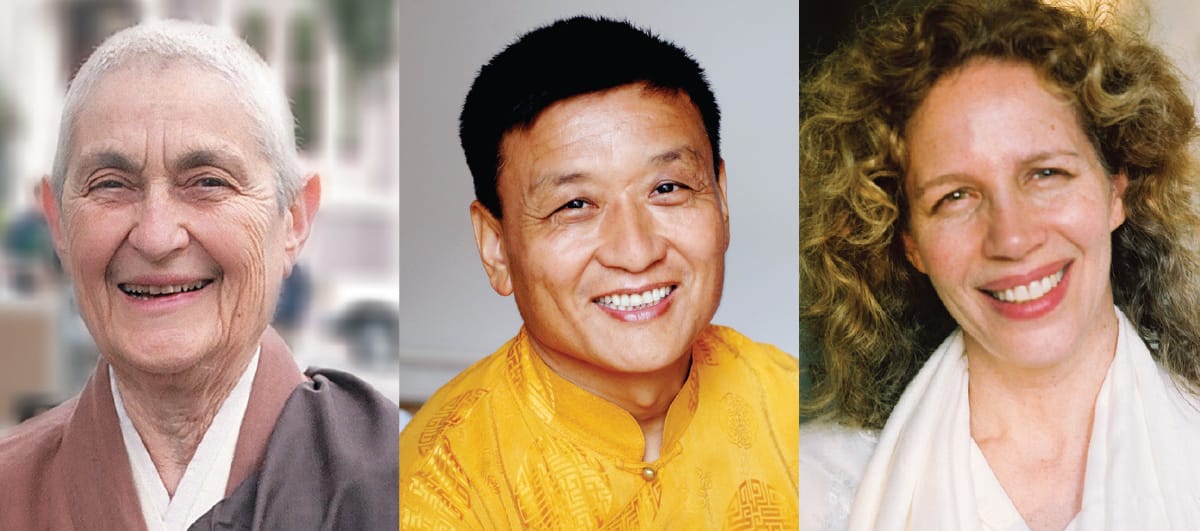Question: I am a Zen Buddhist practitioner and I live many states away from the order with which I practice, so most of the time I practice alone even though there is a large community of Tibetan Buddhists and teachers nearby. I feel an affinity with Zen Buddhism, and I wonder about that attachment. Am I missing something by not opening myself to the teachings of those where I live?
Narayan Helen Liebenson: I don’t think it’s a question of missing something, unless you feel it would be beneficial to have a community to practice with that’s geographically closer so you are not so alone. I see this more as an affinity based on one’s karma, and the inclination to practice in one tradition over another to be an alignment with a particular vocabulary, set of rituals, and atmosphere. Often it is our connection to a teacher that draws us into a particular tradition.
Your affinity with the Zen tradition may not be an attachment, but rather a family feeling that should be respected. When we go to certain centers we feel at home, and if this feeling is strong, it feels like our long
lost home. This helps us find home within ourselves. When we go to other centers and traditions, we may appreciate and respect what we see happening there, but we may not feel as comfortable and at ease. Twenty-five years ago, when opening the Cambridge Insight Meditation Center, Larry Rosenberg, the center’s founder, met with the Dalai | Lama for advice. His Holiness reminded him that all Buddhist traditions are based on the four noble truths, and are fundamentally the same. He said the most important thing was to keep the four noble | truths in mind. I have been to many Buddhist centers and have felt profoundly at home in every one of | them, regardless of the tradition. The feeling of family p is always present. In the world of Buddhism, I feel that the Theravadan tradition is my immediate family and the others are my extended family, just as in the world at large I feel that Buddhism is my immediate family and everyone else is my extended family. Of course it is also true that all beings are family.
One of the great sufferings in the world is caused by sectarianism, which pits one tradition, one sect, one religion, against another. There is a human tendency to think that whatever you are doing is the best thing to be doing and others should do it too. This reveals itself not only between the various Buddhist traditions but within the traditions themselves. Whatever we can do to work against this tendency is an expression of the Buddha’s teachings, which was not the encouragement of greater worldly sectarianism but a path of inner freedom.
Tenzin Wangyal Rinpoche: Among all the approaches of buddhadharma there is no conflict in the wisdom teaching that all beings have awakened nature, a nature pure and boundless. Failing to recognize this nature, one suffers; in recognizing this nature, one is liberated from suffering. One who fully awakens is referred to as buddha. Meditation supports the moment-to- moment recognition of this nature and its full maturation and expression in a life that benefits others. In relation to this pure and open space of being there is no author, no owner or name, and no divisions or schools.
In the Bön tradition of Tibet, the historical buddha, or awakened teacher, was Tonpa Shenrap. He had and continues to have many disciples who attained realization and themselves were and are considered buddhas. In India, Shakyamuni Buddha brought forth teachings and articulated methods to discover and connect with the source of being. The teachings of these buddhas have spread to many countries and cultures through the vital student- teacher relationship. These lineages of unbroken relationship have resulted in schools or traditions that continue today and have entered Western culture.
While the core teaching of Buddhism is the same, the outer form and expression of the teachings has been influenced by the cultures in which the teachings have taken root. That form or appearance varies greatly. The purpose of a tradition is to hold and preserve knowledge and methods, and to enrich a body of knowledge through the experiences of its practitioners. It is not to create divisions.
It is quite natural that you may feel more at home in one approach than another. Indeed, to mature on the spiritual path, commitment of one’s focus and effort is necessary and encouraged. If you feel strong enough in your practice, you can participate with other forms and those forms can enrich your experience without changing your main form of practice. Visiting, and listening to or engaging in dharma talks—particularly anything that supports opening the heart or cultivating love, compassion, joy, and equanimity—is to be encouraged. Participate, feel supported by the sangha, engage in activities of service, but do your own practice. Find a balanced way to engage with other schools that doesn’t interfere with your root connection, but serves to enrich or expand your experience.
Zenkei Blanche Hartman: When you refer to the order with which you practice being many states away, I wonder whether you have a relationship with a teacher there? If so, I would suggest that you explore this question with him or her, especially if you have taken refuge or received the precepts in that order.
While it is true that the style and forms of practice in Zen and Vajrayana are different, there is one buddhadharma. In fact, if the practice of the Tibetan sangha in your area is in the Dzogchen or Mahamudra tradition, you may notice a similarity in the style of meditation to the Zen meditation with which you are familiar. If your teacher has no objection, I would encourage you to explore whether you may benefit from having a relationship with a sangha and people to practice with on a regular basis where you are.

